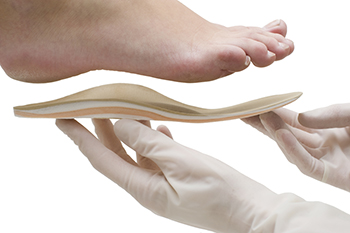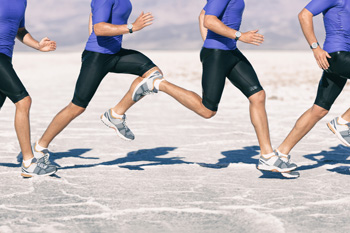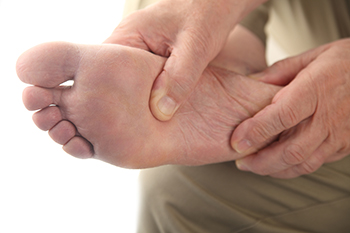Items filtered by date: May 2023
Excessive Standing With Standing Desks

Despite the fact that sitting for prolonged periods of time is not always good for the health of the feet, neither is uninterrupted standing. Individuals who use standing desks at the office ought to take note of this principle, as standing desks encourage individuals to stand still on their feet for prolonged periods of time. Doing so can exert excess pressure on the feet and facilitate stiffness in the muscles of the feet. All of this can make the onset of foot conditions such as plantar fasciitis more likely. If you are someone that uses a standing desk at the office, it is suggested that you schedule an appointment with a podiatrist today to learn more about how to care for your feet in addition to receiving any treatment you may need.
While working on the feet, it is important to take the proper care of them. For more information about working on your feet, contact Dr. Mark Gagnon from Advanced Podiatry. Our doctor will treat your foot and ankle needs.
Working on Your Feet
Standing on your feet for long periods of time can cause stress and pain in your feet. Your whole body may experience change in terms of posture, back pain, bunions, callouses and or plantar warts. There are ways to avoid these conditions with proper foot care, smart choices and correct posture.
Positive Changes
Negative heeled shoe – Choosing this shoe type places the heel slightly lower than the ball of the foot. These are great for overall foot health. Find shoes that fit you correctly.
Go barefoot – Our feet were not designed to be enclosed for all hours of the day. Try to periodically expose your feet to air.
Eliminate Pain
Foot Exercises – Performing simple exercises, incorporating yoga and doing stretches are beneficial. This will allow increased blood flow to the area and muscles of the foot.
Achilles tendon – Stretching the foot out flat on the floor will relax the calf muscles and tendon. These exercises can be performed almost anywhere. Make sure you add these exercises to your daily regimen.
With a little bit of this information and knowing more about foot health, you will notice changes. Foot stretches and proper footwear will help with pain and prevent further issues.
If you have any questions please feel free to contact one of our offices located in Crestwood, Orland Park, and Summit, IL . We offer the newest diagnostic and treatment technologies for all your foot and ankle needs.
Orthotics and Lower Back Pain

Lower back pain is not something to take lightly, as it can dramatically affect your overall health and well being. Interestingly, lower back pain has a notable connection to the feet, since the feet are essentially the foundation of the entire human body. Orthotics, or shoe inserts that are custom or over-the-counter, can be used to address lower back pain. Orthotics are a non-surgical, non-invasive option that might be used by patients to address their lower back pain without undergoing a surgical procedure. The orthotics can be used to put the feet in optimal alignment and motion, thereby supporting the back. If you are someone that is struggling with lower back pain or chronic back pain, it is suggested that you schedule an appointment with a podiatrist who can provide guidance, advice, and assistance regarding custom orthotics.
If you are having discomfort in your feet and would like to try orthotics, contact Dr. Mark Gagnon from Advanced Podiatry. Our doctor can provide the care you need to keep you pain-free and on your feet.
What Are Orthotics?
Orthotics are inserts you can place into your shoes to help with a variety of foot problems such as flat feet or foot pain. Orthotics provide relief and comfort for minor foot and heel pain but can’t correct serious biomechanical problems in your feet.
Over-the-Counter Inserts
Orthotics come in a wide variety of over-the-counter inserts that are used to treat foot pain, heel pain, and minor problems. For example, arch supports can be inserted into your shoes to help correct overarched or flat feet, while gel insoles are often used because they provide comfort and relief from foot and heel pain by alleviating pressure.
Prescription Orthotics
If over-the-counter inserts don’t work for you or if you have a more severe foot concern, it is possible to have your podiatrist prescribe custom orthotics. These high-quality inserts are designed to treat problems such as abnormal motion, plantar fasciitis, and severe forms of heel pain. They can even be used to help patients suffering from diabetes by treating foot ulcers and painful calluses and are usually molded to your feet individually, which allows them to provide full support and comfort.
If you are experiencing minor to severe foot or heel pain, it’s recommended to speak with your podiatrist about the possibilities of using orthotics. A podiatrist can determine which type of orthotic is right for you and allow you to take the first steps towards being pain-free.
If you have any questions please contact one of our offices located in Crestwood, Orland Park, and Summit, IL . We offer the newest diagnostic and treatment technologies for all your foot and ankle needs.
Foot Vessels

A vessel is essentially a kind of tube that facilitates the movement or circulation of blood throughout the body. The blood in the body needs to reach the feet, among the other different parts of the body. There are several different vessels that help facilitate blood circulation to the feet. For example, the popliteal artery is one of the most important vessels in this context. Other important vessels include the posterior tibial artery, anterior tibial artery, peroneal artery, plantar arteries, and the dorsalis pedis. All of the aforementioned vessels are critical to promoting blood circulation and therefore might be affected if an individual has particularly poor blood circulation to the feet. If you are someone that struggles with poor circulation in the feet or wants to learn more about the vessels in the feet, it is suggested that you schedule an appointment with a podiatrist today.
If you have any concerns about your feet, contact Dr. Mark Gagnon from Advanced Podiatry. Our doctor can provide the care you need to keep you pain-free and on your feet.
Biomechanics in Podiatry
Podiatric biomechanics is a particular sector of specialty podiatry with licensed practitioners who are trained to diagnose and treat conditions affecting the foot, ankle and lower leg. Biomechanics deals with the forces that act against the body, causing an interference with the biological structures. It focuses on the movement of the ankle, the foot and the forces that interact with them.
A History of Biomechanics
- Biomechanics dates back to the BC era in Egypt where evidence of professional foot care has been recorded.
- In 1974, biomechanics gained a higher profile from the studies of Merton Root, who claimed that by changing or controlling the forces between the ankle and the foot, corrections or conditions could be implemented to gain strength and coordination in the area.
Modern technological improvements are based on past theories and therapeutic processes that provide a better understanding of podiatric concepts for biomechanics. Computers can provide accurate information about the forces and patterns of the feet and lower legs.
Understanding biomechanics of the feet can help improve and eliminate pain, stopping further stress to the foot.
If you have any questions please feel free to contact one of our offices located in Crestwood, Orland Park, and Summit, IL . We offer the newest diagnostic and treatment technologies for all your foot and ankle needs.
Diabetic Foot Care

Diabetes can harm the feet and can lead to serious complications. If one has diabetes, there can be loss of feeling in the feet. Because of this, a good foot care regimen is critical. This can include washing, drying, and moisturizing the feet daily. It is important to check the feet each day for abnormalities, such as sores, blisters, or swelling. A hand mirror can help with this if one has trouble seeing or reaching their feet. Walking barefoot is discouraged since it can be easy to step on something and hurt the feet without realizing it. Also, wearing shoes that fit well and do not have linings that may cause friction on the feet is part of a good foot care plan. Additionally, keeping blood sugar levels under control is crucial. If you have diabetes and want to do what you can to make sure your feet are not harmed, it is suggested that you include a podiatrist as part of your medical team for regular examinations and management tips.
Diabetic foot care is important in preventing foot ailments such as ulcers. If you are suffering from diabetes or have any other concerns about your feet, contact Dr. Mark Gagnon from Advanced Podiatry. Our doctor can provide the care you need to keep you pain-free and on your feet.
Diabetic Foot Care
Diabetes affects millions of people every year. The condition can damage blood vessels in many parts of the body, especially the feet. Because of this, taking care of your feet is essential if you have diabetes, and having a podiatrist help monitor your foot health is highly recommended.
The Importance of Caring for Your Feet
- Routinely inspect your feet for bruises or sores.
- Wear socks that fit your feet comfortably.
- Wear comfortable shoes that provide adequate support.
Patients with diabetes should have their doctor monitor their blood levels, as blood sugar levels play such a huge role in diabetic care. Monitoring these levels on a regular basis is highly advised.
It is always best to inform your healthcare professional of any concerns you may have regarding your feet, especially for diabetic patients. Early treatment and routine foot examinations are keys to maintaining proper health, especially because severe complications can arise if proper treatment is not applied.
If you have any questions please feel free to contact one of our offices located in Crestwood, Orland Park, and Summit, IL . We offer the newest diagnostic and treatment technologies for all your foot and ankle needs.
Wearing the Right Shoes for Pickleball

Pickleball is a sport that has become increasingly popular. It is defined as a combination of badminton and tennis, and while it is enjoyable for many people, it may cause heel pain. Plantar fasciitis is a common condition that can happen from frequently playing pickleball, and it may be beneficial to purchase shoes that are designed for this sport. Shoes of this type can help to protect the feet and are referred to as court shoes. They are made of materials that allow easy movement from side to side and can cushion the foot from impact. The upper part of this type of shoe has heavier and thicker material which can help to reinforce the ankle. This can be beneficial as it moves in quick bursts from side to side. Additionally, the midsole is thinner when compared to running shoes, and can protect the foot more efficiently as the game is played. If you would like to learn more about the type of shoes that are needed to play pickleball, it is suggested that you confer with a podiatrist who can guide you toward the right choice.
Sports related foot and ankle injuries require proper treatment before players can go back to their regular routines. For more information, contact Dr. Mark Gagnon of Advanced Podiatry. Our doctor can provide the care you need to keep you pain-free and on your feet.
Sports Related Foot and Ankle Injuries
Foot and ankle injuries are a common occurrence when it comes to athletes of any sport. While many athletes dismiss the initial aches and pains, the truth is that ignoring potential foot and ankle injuries can lead to serious problems. As athletes continue to place pressure and strain the area further, a mild injury can turn into something as serious as a rupture and may lead to a permanent disability. There are many factors that contribute to sports related foot and ankle injuries, which include failure to warm up properly, not providing support or wearing bad footwear. Common injuries and conditions athletes face, including:
- Plantar Fasciitis
- Plantar Fasciosis
- Achilles Tendinitis
- Achilles Tendon Rupture
- Ankle Sprains
Sports related injuries are commonly treated using the RICE method. This includes rest, applying ice to the injured area, compression and elevating the ankle. More serious sprains and injuries may require surgery, which could include arthroscopic and reconstructive surgery. Rehabilitation and therapy may also be required in order to get any recovering athlete to become fully functional again. Any unusual aches and pains an athlete sustains must be evaluated by a licensed, reputable medical professional.
If you have any questions please feel free to contact one of our offices located in Crestwood, Orland Park, and Summit, IL . We offer the newest diagnostic and treatment technologies for all your foot and ankle needs.

